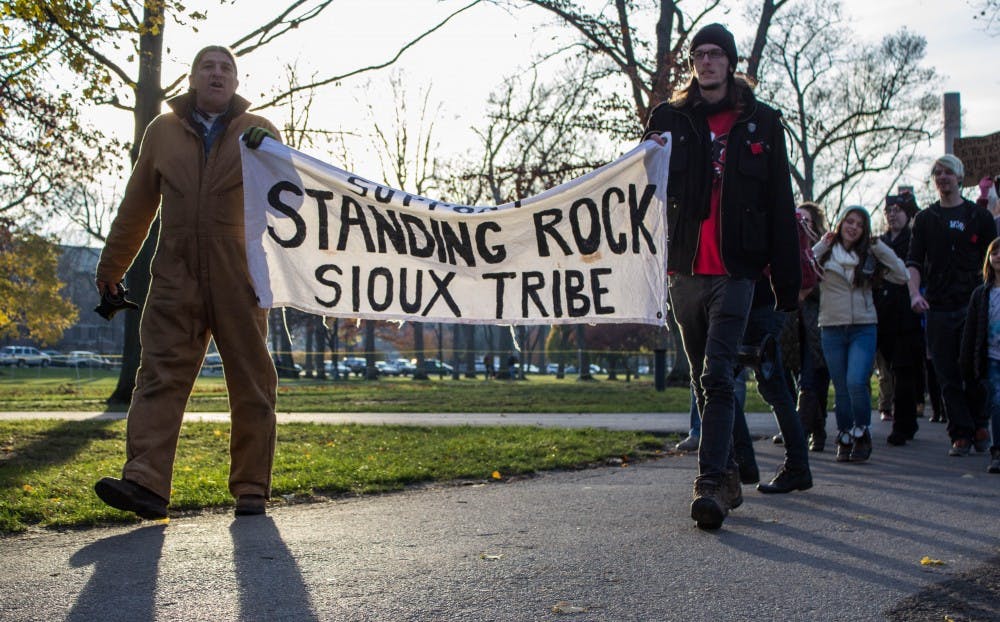It was a regular, chilly Monday afternoon when traffic came to a standstill at the Scramble Light.
Community leaders, students and Muncie citizens came together in a wave of support for Standing Rock Sioux Nation in North Dakota, marching and chanting through the Quad, the Scramble Light and ending at the University Green.
"To see the students gathered here and taking an interest in this gives me an incredible amount of hope for our future leaders," said Kelli Huth, director of immersive learning for entrepreneurial learning. "Maybe you won't all screw this up like the generations before us have screwed this up."
RELATED: Ball State faculty member returns from Standing Rock in North Dakota
Progressive Student Alliance, Ethnic Theater Alliance, Men and Women of Color, Call To Action, BSU Feminists for Action and the Muncie Green Party were all co-organizers of the march.
Stacy Stinson (native name Waapee Tomei) of the Lakota nation took part in the event and spoke to the demonstrators about Native American rights and the need to switch to renewable energy.
"That's always been part of our native philosophy — what we do, we do today in honor of the future generations," Stinson said.
The demonstration was one of hundreds that have taken place across the nation to show solidarity with water protectors at the Standing Rock camp in North Dakota, who have been protesting against the construction of a crude oil pipeline since April.
Water protesters gained a promising step forward Dec. 4 when the Army Corps of Engineers refused to grant the final permit that would lead to the completion of the pipeline.
RELATED: Faculty member, water protectors praise blocked route of Dakota Access Pipeline
But demonstrators were quick to warn that this wasn't the end of the fight.
David Herbert of Muncie Fine Portraits spent two weeks living at Standing Rock and did not think the oil company, Energy Transfer Partners, would adhere to the regulations.
"They're not going to stop the drilling," he said. "This won't matter to them."
Stinson echoed those sentiments.
Story continues after this video.
"We can't believe this is a victory and go home and celebrate," Stinson said. "This was one battle, but the war continues."
The future of the pipeline is made even more uncertain by the change in presidency in January. Trump currently has personal investments with Phillips 66, which owns a quarter of the pipeline, and he has been supportive of its construction.
"It's terrifying what could still happen up there," Huth said. "I'm concerned about what we'll be able to get done before the Trump administration takes over."
Stinson said although he was happy the company was backing down from Standing Rock, the rerouting of the pipeline posed a threat to other areas.
"There's a lot of pipelines being built down here. There's a lot of money being invested in the dead future of fossil fuels," he said. "We need to put a stop to it now, so that we can succeed in keeping the generations alive for future generations."
Stinson said that those who were profiting off the Dakota Access Pipeline were "enjoying their greed now, and feasting at their own tables now, at the expense of their own [future] generations."
“We’ve got the brainpower. We’ve got the willpower. All we need now is the 99 percent to stand up and say, 'no more,'” he said.





